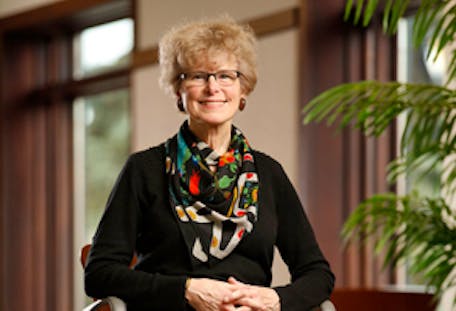NP Advocate's Career Forged by Close Relationships, Collaboration
By Patrick Broadwater
Monday, June 5, 2017
Don’t let the warm smile and soft voice fool you. There’s a fiery side to Jane Tuttle, PhD, APRN, FNP-BC, FAANP, that comes out whenever she feels nurse practitioners have been disparaged.
“People like to lump nurse practitioners and physician assistants into this mid-level provider category. It’s hierarchical and it’s not helpful,” said Tuttle, professor of clinical nursing and specialty director of the UR School of Nursing’s family nurse practitioner program. “Don’t let anyone call you a mid-level provider. You’ve built on your nursing background and gained these additional skills. You’re not a half-baked anything.”
 There is perhaps no bigger supporter of nurse practitioners and the role they will play in addressing the health care provider shortage than Tuttle, a distinguished educator and clinician, who retired this July after more than 40 years’ experience as an NP. Her beliefs have been heavily shaped by close relationships with some of the profession’s giants, including Eleanor Hall and NP co-founder Loretta Ford.
There is perhaps no bigger supporter of nurse practitioners and the role they will play in addressing the health care provider shortage than Tuttle, a distinguished educator and clinician, who retired this July after more than 40 years’ experience as an NP. Her beliefs have been heavily shaped by close relationships with some of the profession’s giants, including Eleanor Hall and NP co-founder Loretta Ford.
Hall, credited with paving the way for an independent school of nursing at the University, and Ford, who would become the first dean, were already legends in the field by the time Tuttle became a student here in the late 1970s. Hall was a member of Tuttle’s church, and over decades of friendship they had many discussions about the school and the nursing profession. “I really came to appreciate Eleanor’s wisdom,” Tuttle said. “I just enjoyed her perspective and her company. It was a treat to spend time with her.”
Tuttle also grew close with Ford after the NP founder spoke at Tuttle’s graduation from the NP program at the University at Buffalo in 1976. She later followed Ford to the UR School of Nursing, earning bachelor’s and master’s degrees. “I admire her a lot,” Tuttle said. “I love talking with Lee about disruptive innovations and shaking things up. Whenever an NP would move forward and a physician would react in a negative way, she would say, ‘If they’re worried, good. That means we’re making progress.’ She is a tiny woman, but she has amazing courage and a lion’s heart.”
Colleagues such as Elaine Hubbard, Marilyn Aten, and Harriet Kitzman were also instrumental in Tuttle’s development as a student and her career as an educator. She says Hubbard, then associate dean, encouraged her to go on for her master’s degree, while Kitzman served as an important sounding board in her decision to pursue a PhD in family studies at Yale. As Tuttle was completing the doctorate, she ran into Aten, who recruited her back to Rochester.
After teaching for eight years at Yale, Tuttle joined the UR School of Nursing faculty in 1993 and immediately set about revamping the family nurse practitioner program. Although once accused of not being imperialistic enough to be successful in an academic setting, Tuttle worked with faculty to push through key revisions that bolstered the pediatric and women’s health content in the program.
“I think my collaborative style has left its mark in terms of the third way,” said Tuttle, who directed the FNP program for more than 20 years. “I’ve always felt that there’s got to be a way that we can work together and make the right things happen. I’m pretty proud of that.
“Standing on the shoulders of these giants, I feel really blessed to have grown up here as a nurse, advanced practice nurse, and director of our family program,” said Tuttle. “I’m inspired every day by the people before me and thinking about the future of this school and how we’re moving in the right direction. I’m really lucky to have been here for these years.”
This story is also featured in the Spring 2017 NURSING magazine.Categories: Nurse Practitioner Programs, PhD, Alumni

